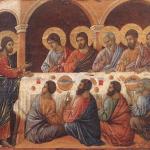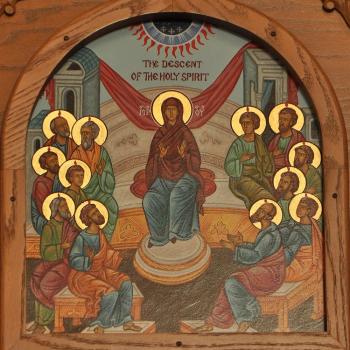Hadewijch, a 13th century mystic, once mentioned a transformative experience she had on Pentecost:
Once on Pentecost Sunday I received the Holy Spirit in such a manner that I understood all the will of Love in all, and all the modes of this will of the heavens and of heavenly things, and all the perfection of perfect justice, and all the shortcomings of the lost; and with regard to all, I saw the will in which they then were, either of truth or of falsehood. And since then I have felt in the same way the love of all the persons I saw, in whatever degree they then were. And then I understood all the languages that are spoken in the seventy-two ways. [1]
Pentecost, Hadewijch said, changed her, so that she learned to love all people. Love bound her to them. It did not matter who they were, what they were like, what spiritual condition or shortcomings they had, she was able to see that there was something good within each and every person, something worthy of being loved. It was granted to her grasp, at least in part, what God sees in us, and why God loves everyone. And this happened on Pentecost because Divine Love is normally exemplified by the Holy Spirit, so that those touched by the Holy Spirit and perceive the world through the Spirit, are led to love all.
Those who open themselves up to the Spirit on Pentecost should experience a call towards love of all in their lives. The Holy Spirit builds up and purifies all things. Sin, which by its nature nihilistically destroys what it touches, breaks things apart. Humanity, in its embrace of sin, has been divided and turned in against itself, with various parts of humanity fighting other parts, creating various forms of unjust rivalries. Race, gender, nationality, creed – they have all been used as means by which sin creates division in humanity. Each group, each division of humanity likes to think of itself as great, or having been great and should be great again. The greatness they want is not the greatness of love given by grace, but the pseudo-greatness established by sin, a greatness which looks upon oneself as great by pressing down and destroying others. That is the law of sin, the so-called law of the jungle, asserts greatness by taking it from others, destroying them if necessary.
Pentecost, with the coming of the Holy Spirit, promotes true greatness through holiness. It teaches a reversal of the path of sin and domination. The Spirit of Love comes to heal what has been damaged including, and especially human unity. The church, by its nature, overturns sexism and nationalism as it brings humanity together as one, showing that divisions based upon such distinctions have no place in Christ. This is what we should get out of the book of Acts when we read that the early believers came together as one: they came together, became filled with the Holy Spirit, and all barriers between then vanished (represented by the way they spoke in tongues):
When the day of Pentecost had come, they were all together in one place. And suddenly a sound came from heaven like the rush of a mighty wind, and it filled all the house where they were sitting. And there appeared to them tongues as of fire, distributed and resting on each one of them. And they were all filled with the Holy Spirit and began to speak in other tongues, as the Spirit gave them utterance (Acts 2:1-4 RSV).
The church is founded upon unity. Sin and division continues to fight against the church and disrupt the work of the Spirit within it, which is why, despite its ontological foundation and its eschatological nature, we find the spirit of division existing within Christianity itself. When the prompting of the Holy Spirit is ignored, when the temptation towards sin is accepted, rivalries form; power struggles emerge, and people within the church suffer. What is needed is unity, and not any kind of unity, but unity in the Holy Spirit, a unity formed out of love and respect.
Insofar as we ignore the dictates of love, insofar as we sin, we need to refocus our lives, overcoming sin so that we can then become true bearers of the Spirit. Our sins, our antagonism, our hate, our greed, or selfishness continues to wound the historical church. All the thoughts, words and deeds which encourage us to remain divisive, to remain as we are, need to be silenced: then we can focus on the Spirit, welcome the Spirit, and see the transformation in ourselves so that we can then be a part of the change which is necessary. The more we do this, Tauler told us, the more we will be revealed the presence of the Spirit in us:
Yet, if we wish to feel His action, if we desire to savor His presence, then we must bring ourselves to a focus, shut out external matters, and allow the Holy Spirit to unfold within us in stillness and repose. In this manner we first and foremost become aware of Him and so He reveals Himself to us. Our awareness will increase in proportion to our consent. And hour by hour He will reveal Himself more clearly, although He has been given to man from the very beginning. [2]
If we want to embrace the Holy Spirit, if we want to experience the blessings of Pentecost, we must open up to the Spirit and embrace its dictates, the dictates of love. It is a fiery love which cleanses all things, purifying them, so as to make them stronger, better than before, as Richard of St. Victor explained:
What is the Holy Spirit except the divine fire? All love is a fire, but a spiritual fire. What a corporeal fire does for iron, the fire, about which we are speaking, does the same for an impure, cold, and hardened heart. In consequence of the infusion of such a fire, the human mind gradually removes all blackness, coldness, and hardness; and the whole mind changes into the similitude of him who inflames it.[3]
When we embrace the Spirit, the Spirit which is everywhere present and fills all things, the Spirit which we are sealed in the sacrament of chrismation (confirmation), we let ourselves become molded by it, to become actors who act not out of selfish conceit but out of love. It is not just any love, but a fiery love, a transformative love, a love which seeks to bring others into its confines, so that they too may share in this glorious love, a love which knows no end. And we do so, it brings us together with others who are also inflamed by, making us one. This should not be surprising: if we are transformed into a similitude of the Spirit, of the fiery love, then we become like a flame: when two flames come together, they merge as one.
The Holy Spirit on Pentecost came down upon the believers who had come to wait for its blessings. As they were receptive of the Spirit, tongues of fire were seen coming across them. As they spoke and glorified God, they did so in a way which transcended all boundaries: the words they said came out no longer particularized but universalized, able to be heard and understood by everyone, no matter what their native language had been. The boundaries of the nations were overcome. From its very inception the church showed itself to be higher and greater than the self-glorification and adulation of the nations.
The tongues of fire, the fiery love of the Spirit, continues to abide within the church, allowing the church to speak the Word of God and to transform the world. Sergius Bulgakov, understanding this, said that we see and experience the effects of these tongues in our sacraments and in our prayers:
All the sacraments, prayers, and sacramentalia of the Church are the tongues of fire of Pentecost which abides in the world. And the entire holiness of the Church, the spiritual gifts and achievements, is realized by the power of Pentecost.[4]
It is in and through the Holy Spirit, through the invocation of the Spirit, the church is able to bring the grace of the Word into the whole world, transforming it, spiritualizing it. We have the tongue of fire, the tongue which enables us to speak in the Spirit, so that the Word can then become manifest, bringing in such speech, the continued incorporation of the earth into heaven.[5]
Pentecost is the descent of the Holy Spirit upon the church. How we encounter the Spirit, what we will do with the Spirit when it is before us, is in part, up to us. Will we negate it through sin and dissension, or will we like Hadewijch open ourselves up to it, allowing us to see and know all things in the Spirit of Love? To be sure, as the Spirit comes to us with the purifying fire of God’s love, it is not easy to embrace the Spirit: we must let that fire, that love, penetrate us, burning up all that is unlove in us. Just as with physical healing, such spiritual healing might come with some pain; the point is not the pain, but what comes after, and so we must remember this in order not to become sadists who focus on pain as being good in and of itself. All pain, all suffering, indicates some evil; pain and suffering must never be our goal. Rather, we must remember the point of all healing is to overcome such pain, such suffering, and the evil contained within it. Once unlove has been cut away from us we can be built up by love. The Spirit transforms us; where needed, it cauterizes spiritual wounds, so that in the end, all the evil of suffering can be overcome and we can find ourselves no longer in pain, but experiencing life eternal in beatitude.
On Pentecost, the glory of love, the glory of the Spirit of love, is revealed in the unity which is established by such love. The division of the nations is overcome. Christ, who came to bring all together as one has sent the Holy Spirit among us. Now, through the tongue of the Spirit and the Word of God, we are called not only to unity but to call others to that very same unity as well.
[1] Hadewijch, “Vision 2: Experience of Pentecost” in The Complete Works. Trans. Columba Hart, OSB (New York: Paulist Press, 1980), 271.
[2] Johannes Tauler, “Sermon 26” in Sermons. Trans. Maria Shrady (New York: Paulist Press, 1985), 92.
[3] Richard of St. Victor, On the Trinity in Victorine Texts in Translation: Trinity and Creation. Ed. Boyd Taylor Coolman and Dale M. Coulter (Hyde Park: NY: New City Press, 2011), 334.
[4] Sergius Bulgakov, Churchly Joy: Orthodox Devotions for the Church Year. Trans. Boris Jakim (Grand Rapids, MI: William B. Eerdman’s Publication, 2008). 130.
[5] The relationship between the tongues of fire and the Word of God was beautifully expressed by St. Gregory Palamas: “Why did He appear in the form of tongues? It was to demonstrate that He shared the same nature as the Word of God, for there is no relationship closer than that between word and tongue. It was also because of teaching, since teaching Christ’s gospel needs a tongue full of grace,” St. Gregory Palamas, “On Pentecost” in Saint Gregory Palamas: The Homilies. trans. Christopher Veniamin and the Monastery of St. John the Baptist Essex, England (Waymart, PA: Mount Thabor Publishing, 2009), 194.
Stay in touch! Like A Little Bit of Nothing on Facebook.
If you have liked what you read, please consider sharing it with your friends and family!
















